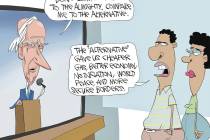Fighting indecency
A federal appeals court on Tuesday tossed out a government policy that led to broadcasters being fined for allowing even a single curse word on live television. The court held the rule was unconstitutionally vague and had a chilling effect on First Amendment expression.
A three-judge panel of the 2nd U.S. Circuit Court of Appeals struck down the 2004 FCC policy, which said that profanity referring to sex or excrement is always indecent.
"By prohibiting all 'patently offensive' references to sex, sexual organs and excretion without giving adequate guidance as to what 'patently offensive' means, the FCC effectively chills speech, because broadcasters have no way of knowing what the FCC will find offensive," U.S. Circuit Judge Rosemary S. Pooler wrote for the appeals court.
The ruling is a victory for the broadcast TV networks, which jointly sued the FCC in 2006 after a tougher crackdown on indecency over the airwaves.
The court pointed out that the law had led several CBS affiliates not to air the Peabody Award-winning "9/11" documentary, which contained some expletives in audio footage from firefighters responding to the 9/11 attacks.
Parents can have a legitimate concern over the TV in the living room becoming a gushing sewer pipe of unwelcome language, images and situations. But broadcasters in search of wide family markets have strong economic incentives to avoid that, even absent government fines, since viewers will change channels if they're frequently offended -- and paid advertisers will follow.
The court is right, here. Expecting broadcasters to eliminate every "discouraging word" from live broadcasts and documentaries about life-threatening situations -- with penalties which could include loss of license, an economic "death sentence" -- is absurd, and has an obvious chilling effect on free speech and public discourse.























